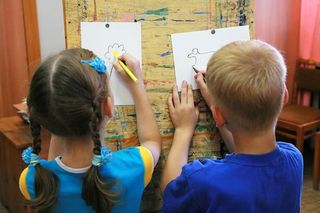Children of Older Men Suffer Lower IQ

A new study of old data on 33,000 young U.S. children finds those with older fathers had reduced cognitive abilities. The differences, however, are slight, and no study has been done to see how such children fare later in life.
"The older a dad is, the worse his children tend to do in intelligence tests," said study leader John McGrath from the University of Queensland.
The reason may involve aging sperm.
"We are concerned that older men accumulate more mutations in the developing sperm cells," McGrath said. "These mistakes then pile up and increase the risks of problems in the children, and it is possible that these mistakes will carry on into the next generation."
The study — a fresh analysis of data on births from 1959 to 1965 — adds to a growing body of work that illustrates there are increased risks to the offspring of men who father them later in life.
A study in 2006 found older men are more likely to father dwarfs, due to an age-related genetic mutation in their sperm. Other studies have shown a link between older fathers and increased chances of schizophrenia and autism in the children, McGrath said. The New York Times noted that a 2005 study found children aged 16 and 17 who had older fathers scored lower on nonverbal IQ tests, but so did children of teenage fathers.
In the database McGrath drew from, children were tested at eight months, four years and seven years on a variety of intelligence tests to measure concentration, memory, learning, understanding, plus speaking and reading ability. The children of fathers age 50 or older scored lower on all these measures, on average, compared with children of fathers who were age 20.
Sign up for the Live Science daily newsletter now
Get the world’s most fascinating discoveries delivered straight to your inbox.
Lost or downplayed in most of the stories about the finding this week, however, is that the scores typically differed by just a few points on the various tests. And anyone smart enough to understand IQ tests will tell you they do not give a full measure of any individual's smarts or range of talents.
And it is not known if perhaps the children with lower scores might have caught up as they aged. (A study in 2007 did show that scores on elementary school achievement tests are good predictors of IQ in mid-life.) Further study is needed, McGrath and his colleagues say.
Older mothers are known to birth more children with Down's syndrome. But in the intelligence tests, McGrath said children of older women actually scored higher. His team suspects this is because older women are typically able to spend more time with their children.
The study, not funded by any outside groups, is detailed in the March 10 issue of the online journal PLoS Medicine. McGrath said it has implications for a society where compared to past generations, many couples now wait until later in life to have children.
The findings could also turn a corner on thinking about men vs. women in regards to having children later in life. It's long been assumed by many scientists that because men remained fertile longer, becoming a dad as an old man was no big deal. Dolores Malaspina, a psychiatrist and researcher at New York University Medical Center, told the Times: "It turns out the optimal age for being a mother is the same as the optimal age for being a father."
Robert Roy Britt is the Editorial Director of Imaginova. In this column, The Water Cooler, he looks at what people are talking about in the world of science and beyond.
{{ video="spermotaxis" title="How Sperm Find Eggs" caption="Mice sperm are very good at tracking an egg cell's scent. Sperm enthusiastically swim toward an ovary extract at the bottom of this test channel, even when the extract was diluted 100,000 times." }}
Robert is an independent health and science journalist and writer based in Phoenix, Arizona. He is a former editor-in-chief of Live Science with over 20 years of experience as a reporter and editor. He has worked on websites such as Space.com and Tom's Guide, and is a contributor on Medium, covering how we age and how to optimize the mind and body through time. He has a journalism degree from Humboldt State University in California.

